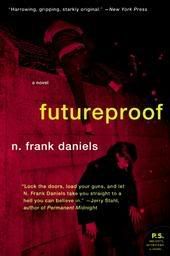 Available from Amazon.com
Available from Amazon.comA fight ensues and the troubled protagonist leaves his home for good. Futureproof is the story of a troubled teen from a troubled family in a troubled world. There is no hope here, no place that offers refuge and no oasis offering sanctuary. There is only desolation, emptiness, and despair which the desperate characters attempt to fill with endless sex in meaningless encounters that devalue the participants and drugs that wash away the tinge of guilt of it all.
One can’t help but feel sorry for Luke. Reader sympathy is evoked, in part, by the way that the author controls the first person point of view. There is a danger when using the first person: the narrator can come across as self-pitying. But here the narrator does not indulge in excessive pity for himself but tells it like it is. And what he tells us is a story of a person trying to fit, to find a place, a role and a purpose in life. But this is not easy when all that one’s life offers is not what one wants.
I’ll never get used to this shit. I’ll never be satisfied doing this work. I can still nail faster than Hank, I can pull up a wall almost as efficiently. But I can’t imagine being thirty, forty years old, and still on my knees, sweating, back aching, one forearm bigger than the other because the right arm is constantly swinging a mallet, right calf muscle gigantic because that leg is used to kick the boards into place just right so that we can fly through another upper-middle class home before heading directly to the next one. I’m making only slightly more money doing this shit than I was pulling in at Andersonville, and every time I think about that it burns me to the core and I want to grab my mallet and hurl it through every fucking window in every fucking house in this artificially contrived “community.”
Luke is a member of an entire subculture of lost souls. His meanderings through life end, temporarily, when he manages to get a job as a floor installer. There he meets a man, Hank, who used to work in the mines. In a scene where Luke attempts to engage Hank in a bit of class consciousness raising conversation, Hank is revealed as a completely downtrodden man, a member of the working class who is incapable of thinking about anything except his own immediate situation and survival. Unlike the sex and drug addicted contemporaries of Luke who are trying to dull out their pain, Hank seems to have disintegrated as a human being, becoming instead a kind of robot whose life is defined by his role as a bottom rung worker. This is what Luke does not want to become but it is the only option that life seems to have for him and his friends. Surely, there is more, somewhere. College and the hopes and aspirations that go with it are not an option here, all that is left is some soul-deadening job, usually manual labor, which offers nothing beyond a meager paycheck. He is not alone in his desire to escape the ravages of the pointlessness of existence. Many members of the X Generation want to rebel against the deadening of the soul, but end up getting medicated.
Those of us that do make it back from the storied institutions tell tales of our parents ruining our lives by sending us to “Peach Ridge” and “Windswept Meadows.” They could be the names of apartment complexes if you didn’t know better. But we know all about them. These places are revolving doors. They drain our parents’ health insurance and then turn us loose more fucked up than we were before. I am an anomaly among most of the kids I meet, though, who count days spent in treatment like tours of duty. Institutionalization is our Viet Nam. And in some way I’m ashamed of never having been shipped anywhere, a draft dodger shirking his duty, squatting in Canadian parks and bus stations until the shit blows over.
The book deals with the tension between idealism and the brutal realities of existence; between faith and the need to believe and the presence of death and decay. Out of this tension comes Luke’s struggle with himself and others like him. In earlier times, this tension would have given rise, perhaps, to some movement, as it did in the 60s. Unfortunately this struggle is no longer seen as legitimate by the society. In the 90s, Salinger’s protagonist would have been forced to take Prozac. Luke’s friends are committed by their parents. The search for meaning of existence has been declared, by the unholy union of big pharma and psychiatry, to be a sign of mental illness. The Woodstock generation has been aborted by Prozac.
Futureproof is a powerful story about the struggle for meaning and hope in a dead world, tracing expertly the course of progress of a man traversing the desolation of poverty and the impact of the journey on himself. Not to be missed.
1 comment:
The above is a superb review of a very interesting and realistic book and I do not feel that I can add much to it. FUTUREPROOF is not a cheerful book, but the future for today's uneducated (and even many educated) youth is not cheerful, either. Read the book to see what awaits the young who have to live at survival level in our society and count your blessings!
Post a Comment